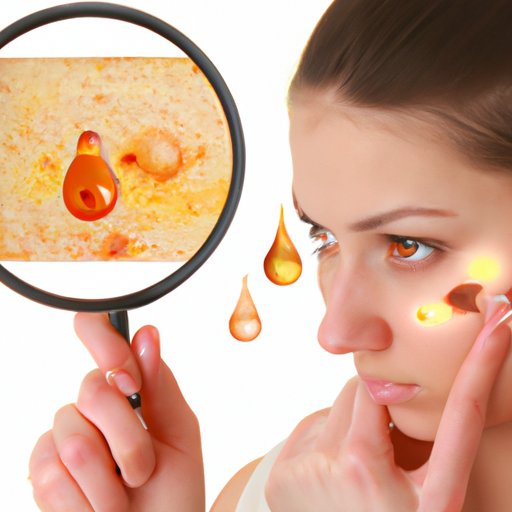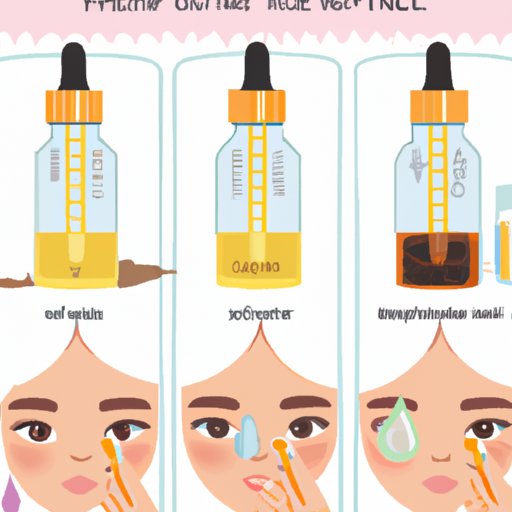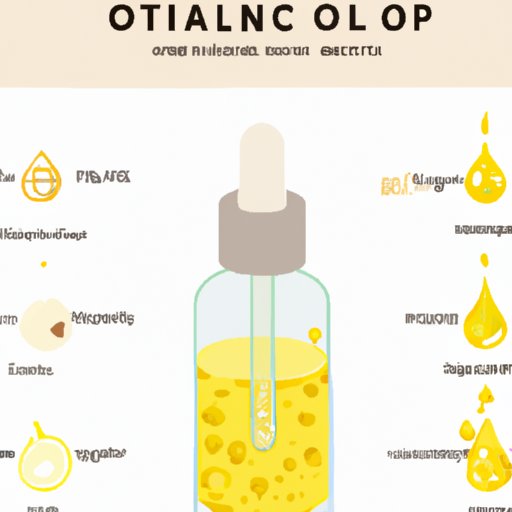Introduction
Mineral oil is a popular ingredient used in many skincare products due to its moisturizing and protective properties. It is derived from petroleum and has been found to be an effective emollient, meaning it helps to retain moisture in the skin and protect it from harsh environmental elements. Despite its popularity, there is still some debate around its safety and effectiveness, particularly with regards to pore clogging.
Pros and Cons of Mineral Oil in Skin Care
When it comes to skin care, mineral oil can have both benefits and risks. On the one hand, it is non-comedogenic, meaning it does not clog pores and can help keep the skin hydrated. Additionally, it acts as a barrier to lock in moisture and protect the skin from environmental damage such as wind or sunburn. On the other hand, some people may find that mineral oil can cause skin irritation or allergies. Furthermore, since it is derived from petroleum, it may contain impurities that could potentially be harmful to the skin.

Investigating the Effects of Mineral Oil on Pore Clogging
The first step to understanding how mineral oil affects pore clogging is to understand what causes pore clogging in the first place. According to the American Academy of Dermatology, pore clogging is caused by a buildup of sebum, sweat, bacteria, and dead skin cells. These substances mix together to form a plug that blocks the opening of the pore and can lead to blackheads, whiteheads, and acne breakouts.
So, how does mineral oil factor into this? While mineral oil itself does not clog pores, it can contribute to pore clogging if it is combined with other substances that are known to clog pores, such as heavy creams, oils, and makeup. This is because the combination of these substances can create a thicker, more occlusive layer on the skin, which can trap dirt, debris, and sebum, leading to clogged pores.
To avoid pore clogging, it is important to use mineral oil sparingly and combine it with non-comedogenic products. For example, you may want to opt for a lighter facial moisturizer rather than a heavier cream, or choose a foundation or concealer that contains fewer oils. Additionally, it is important to gently cleanse the skin on a regular basis to help remove any buildup of dirt, oil, and debris.

Examining the Impact of Mineral Oil on Acne Prone Skin
For those with acne prone skin, it is important to take extra caution when using mineral oil. While it is generally considered safe for all skin types, it can still contribute to pore clogging if it is used too heavily or combined with other comedogenic ingredients. If you have acne prone skin, it is best to opt for non-comedogenic moisturizers, cleansers, and makeup to reduce your risk of pore clogging.
Additionally, it is important to avoid using mineral oil on active acne lesions. This is because it can make the lesions worse by trapping bacteria and oils in the skin and preventing them from escaping. Instead, opt for products specifically designed for acne-prone skin, such as benzoyl peroxide or salicylic acid.

Comparing Mineral Oil to Other Skin Care Oils for Pore Clogging
When it comes to avoiding pore clogging, mineral oil is not the only option. There are many different oils and moisturizers that can be used to keep the skin hydrated without causing pore clogging. For example, jojoba oil and argan oil are two popular alternatives that are non-comedogenic and can help to keep the skin hydrated without clogging pores.
When comparing mineral oil to other oils, it is important to keep in mind that each oil has its own unique set of advantages and disadvantages. For instance, while jojoba oil is non-comedogenic, it is also quite expensive and may not be suitable for all skin types. Similarly, argan oil is an effective moisturizer but can be quite greasy and may not be suitable for those with oily skin.
Conclusion
In conclusion, mineral oil is a popular ingredient used in many skin care products due to its moisturizing and protective properties. However, it is important to note that it can contribute to pore clogging if it is combined with other comedogenic ingredients. Additionally, those with acne prone skin should take extra caution when using mineral oil and opt for non-comedogenic alternatives instead. Finally, it is important to remember that there are many different oils and moisturizers available that can provide the same benefits without causing pore clogging.
Overall, while mineral oil can be beneficial for some skin types, it is important to be aware of the potential risks associated with its use. By following the tips outlined above, you can ensure that you are using mineral oil safely and effectively for your skin type.
(Note: Is this article not meeting your expectations? Do you have knowledge or insights to share? Unlock new opportunities and expand your reach by joining our authors team. Click Registration to join us and share your expertise with our readers.)
